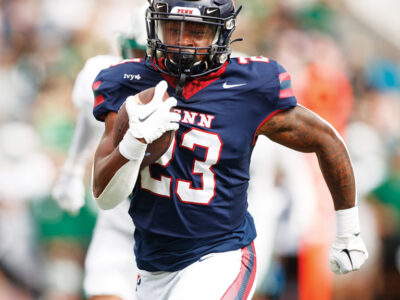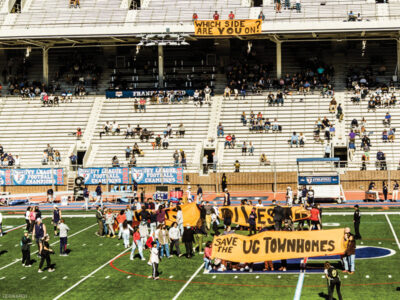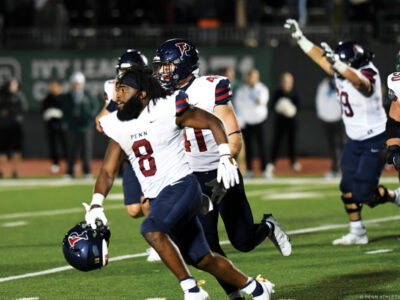“The college football season is over,” began the front-page story in last month’s Philadelphia Inquirer, “but the Penn Quakers took a big hit yesterday: five losses in one day.”
By forfeiting five of the six games it had won during the season on account of a player’s unwitting violation of NCAA eligibility rules, Penn’s varsity football team watched its respectable 6-4 season slip to 1-9. While the scores and individual records will remain on the books, they will be accompanied by an indelible asterisk.
Far more sobering was the hit to Penn’s pride. It was the first time in the history of both the University and the 42-year-old Ivy League that such a thing had happened, and by the time the affair was over, a history professor had publicly accused the athletic department of trying to pull a “sleazy” maneuver to get the player reinstated; the player had publicly accused the history professor of anti-Semitism; and both the player and the University had been skewered by the local and national press. The player was All-Ivy defensive tackle Mitch Marrow, a fifth-year history major regarded as a likely NFL prospect.
But as serious as the matter was, it could have been a good deal worse. A faculty committee formed by then-provost Dr. Stanley Chodorow investigated the matter carefully and concluded that the infractions were “secondary violations,” and that neither Marrow nor the athletic department had intended to deceive anyone. “Clearly, there were substantial errors in action and judgment,” the 12-page “Self-Report to the Ivy League” concluded, but the committee “found no evidence of willful misconduct” on the part of the department. And, on the committee’s recommendation, Penn voluntarily forfeited the games — an action approved by the Ivy League, which will also “vacate” the All-Ivy honor bestowed upon Marrow. (The committee was chaired by Dr. Peter Hand, professor of anatomy, and included Dr. Wayne Worrell, professor of materials science and engineering; Dr. Bernard Lentz, director of institutional research and analysis; and Debra Fickler, Penn’s associate general counsel. Their report was published in Almanac, Penn’s journal of record.)
Though it may be several months before the NCAA issues its formal ruling, Jeff Orleans, executive director of the Council of Ivy League Presidents, said he agreed with Penn’s decision and believed that it would be the end of the controversy. “We would not have accepted it if we were not confident it would be upheld by the NCAA,” he said. “Based on the facts they found, I thought the conclusions and remedies were appropriate.”
The athletic department, though chastened, also agreed with the conclusions. “I think it was the only decision, really,” said Steve Bilsky, W’71, director of the Department of Recreation and Intercollegiate Athletics [DRIA]. “My sense is that on eligibility issues, you really can’t correct [an infraction] that’s already taken place. It’s a pretty black-and-white issue.
“We’ve all learned something from this,” he added, “and I’m convinced that the mistake was absolutely inadvertent and unintentional. And we’ve taken steps to make sure it doesn’t happen again.”
The story itself was inadvertently brought to light by Marrow’s mother — who, on November 19, telephoned Robert Koonce, the department’s athletic academic coordinator, to find out whether her son was on track to graduate and whether his tuition bill would reflect his part-time status. Until then, the department was apparently unaware that Marrow, who had contracted mononucleosis, had dropped two of his four courses back in September. According to NCAA regulations, he was a part-time student and thus ineligible to play or practice with the team. Marrow, unaware that he was ineligible, had continued to play. Between September 20 and November 15, he played in seven games, of which Penn won four.
After the department confirmed, on November 19, that Marrow was a part-time student, he was informed that he could not practice or compete “until and unless he regained full-time status,” the report noted. At that point, the department “sought to restore Mr. Marrow’s full-time status and eligibility” in time for him to play in the November 22 Cornell game, the season finale. Bilsky, the report said, was out of town most of that week for a funeral.
“The DRIA did not understand at that time that only the NCAA has the authority to restore eligibility once an athlete has competed while ineligible,” the committee wrote. “The department mistakenly believed that if Mr. Marrow could be restored to full-time status by adding an independent-study course … he would be eligible to play in the Cornell game.” Denis Elton Cochran-Fikes, C’74, WG’79, the associate athletic director who serves as the NCAA compliance coordinator, reportedly believed that by doing so, Marrow’s full-time status could be made retroactive, making him eligible for the earlier games.
“It is clear that the department acted as it did because of these mistaken beliefs,” the report concluded. “The committee found no evidence that the DRIA acted to secure an unfair competitive advantage or for any other illegitimate reason.”
Cochran-Fikes then contacted the College Advising Office to see whether Marrow’s full-time status could be restored. Dr. Diane Frey, director of advising services in the College, responded that if a faculty member approved a late independent-study course request, then her office would approve it.
Both Marrow and the athletic department then contacted Dr. Beth Wenger, an assistant professor of history who had taught one of Marrow’s history classes. Wenger consulted the history department’s undergraduate chair, Dr. Bruce Kuklick, C’63, Gr’68, and Dr. Lynn Lees, the head of the department, both of whom advised against approving the course. And on November 20, Wenger told Marrow that she would not approve an independent-study course for him.
The department also contacted Dr. Kenneth Shropshire, the associate professor of legal studies in the Wharton School who serves as Penn’s NCAA faculty representative; he reportedly said that he had a project in mind, then met with Marrow and agreed to approve the course. Marrow thus became a full-time student, registered for three course units, and on November 22 played in the Cornell game, which the Quakers won, 33-20.
Two days later, a Philadelphia Inquirer reporter, apparently tipped off by someone at Penn, contacted several members of the University community, including Frey and Dr. Robert Rescorla, the professor of psychology who served as associate dean for undergraduate education in SAS until the end of December. Frey asked Rescorla to review her decision to approve Shropshire’s independent-study course, and on November 25, Rescorla overturned it — at which point Marrow reverted to part-time status. That same day, the report noted, Penn made its “first institutional report to the Ivy League Office of a potential eligibility problem.”
On November 27, the Inquirer broke the story, which was then picked up by various national news organizations. In it, Kuklick called the department’s attempt to get the course approved a “sleazy” maneuver, adding that it “wouldn’t happen under normal circumstances.”
In the committee’s view, both the approval of the course by Shropshire and the denial of the request by Rescorla were “appropriate” and “not out of the ordinary,” and the approval “did not confer a special benefit on him by virtue of his student-athlete status.” At Penn, the report noted, it is “common for independent study courses to be arranged after the drop-add period and even very late in the semester”; such requests are “typically left to a faculty member’s discretion.”
After the story broke, Marrow, angered and embarrassed by the publicity, held a press conference in the office of his lawyer, during which he accused Kuklick of having leaked the story to the Inquirer and of being “anti-Semitic and anti-athletic.” He claimed his problems with Kuklick went back to 1995, when he wrote a paper on the Holocaust that prompted Kuklick to accuse him of plagiarism, a charge upheld by a University panel.
Kuklick, whose wife is Jewish, declined to comment on the charge of bias, telling the Philadelphia Daily News that he “wouldn’t dignify it with a comment.” The following week, Wenger, the Katz Family Assistant Professor of American Jewish History, vigorously defended Kuklick against the charges of anti-Semitism in a letter to the Inquirer.
The committee concluded that both the athletic department and Marrow were at fault. Last spring, the responsibility for monitoring student-athlete enrollment status by reviewing the part-time student listings was transferred to Cochran-Fikes. Unfortunately, the report stated, he “did not fully assume this new responsibility and, in the fall of 1997, he neglected to review the weekly reports until the Marrow eligibility problem surfaced.” And once the problem was discovered, the department should have notified the offices of the president and provost as well as the Ivy League.
As a student-athlete, the committee wrote, Marrow “bears responsibility for understanding the eligibility rules that apply to him,” especially since he had met with the compliance coordinator to confirm his eligibility requirements as a fifth-year athlete, had attended the department’s mandatory eligibility seminars for all athletes, and was provided with the Penn Student-Athlete Handbook outlining the eligibility rules. “Further, if Mr. Marrow lacked understanding of the rules, he should have sought advice from the [department] or his academic advisors on the implication of dropping to a two-unit course load.”
Marrow’s head coach, Al Bagnoli, said that he and his coaching staff knew nothing of Marrow’s eligibility problem, since they are not permitted to see a player’s academic file. He told the Inquirer: “Mitch assumes some of the blame, and he should. He could have researched the matter better … But the degree of responsibility of the compliance people should be more so.”
“I don’t think anything is gained by trying to determine the percentage [of responsibility],” said Bilsky. “Mitch is a good kid. He’s a nice young man. To whatever degree he made a mistake, most people in their late teens and early twenties have made mistakes. Mitch made a mistake and he learned from it.”
Bilsky, who noted that the department is taking a “series of steps” to ensure that the incident is not repeated, said he thought Marrow’s teammates handled the situation “unbelievably maturely,” explaining: “They know what happened on the field. They also know, from the perspective of whether a violation took place or not, that there are consequences. But they’ve shown great balance and great maturity on this.”
“Penn strives to teach its athletes, from their first day on campus, that playing fairly is as important as playing well,” noted the committee’s report. “And Penn has maintained an unblemished record of managing its athletic programs by the book. The incident detailed in this report is an unfortunate exception to that record, an exception the University is committed to ensuring is never repeated.”
As for Marrow, the headline in the January 15 Inquirer was: “Penn’s bad boy wowing NFL scouts at Senior Bowl.”




